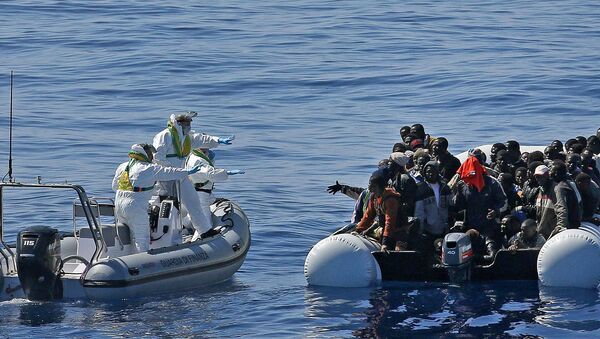After initial plans to relocate 240,000 asylum seekers from Greece and Italy to other member states were scaled back to 160,000, EU officials have so far only managed to move a very limited number people as part of the program.
"On the one-year anniversary of the EU plan to relocate 160,000 asylum seekers from Greece and Italy, the first countries of arrival, the scheme must be judged a farce," said Philippe Dam, spokesperson for Human Rights Watch (HRW).
Which #EU states are contributing (or not enough, or not at all) to #refugee relocation from #Greece & #Italy?https://t.co/odJpgtXkup pic.twitter.com/vgBdkwV3qs
— Philippe Dam (@philippe_dam) October 4, 2016
"First, the EU cut the number by a third. Then, in the year since the plan was approved, it moved just 5,821 people to other member states."
'Politically Finished'?
One of the main factors behind the failure of the relocation plan to date is the political opposition in some member states, who argue that national governments, and not Brussels, should be in control of migration policies.
Chief among the critics has been the Visegrad 4 group of Hungary, Slovakia, Poland and the Czech Republic, who have rejected the notion of a compulsory relocation system.
Hungary PM spokesman says @EU_Commission cheated them on #asylum relocation quotas, "stealth mode of decision making"
— Nikolaj Nielsen (@NikolajNielsen) September 19, 2016
Slovakia, which currently holds the EU presidency, and Hungary have both filed legal action against the EU over the matter in the European Court of Justice, while Hungary last weekend held a referendum against the quota system.
While not enough people voted to validate the referendum, of the people who did take part in the vote, 98 percent agreed that the Hungarian government should reject the relocation plan.
#Hungary
— Arancha Gonzalez (@AranchaGlezLaya) October 3, 2016
880 people granted protection
1,294 refugees 2 accept under EU’s relocation scheme
10,000 residence permits sold 2 non-EU nationals
And despite the European Commission stating that "significant progress" was being made towards the plans, the political criticism, along with the UK and Denmark's actions in opting out of the relocation system, led Slovakian Prime Minister Robert Fico to say the proposals were "politically finished."
Damage to EU Unity
Instead of uniting the EU and establishing a common asylum seeker policy across the bloc, the quota proposals seem to have created more division between member states, with growing divides on how to handle issues related to the migration crisis.
While some countries have been accused of engaging in xenophobia and not pulling their weight on the issue of refugee relocation, many have defended their stance, arguing that the arrival of significant numbers of refugees into Europe will place huge social and economic strain on communities.
Discussion on EU-asylum situation in @EASO Management Board. Have stressed that all member states should take responsibility on relocation
— Rob van Lint (@RobvanLint) September 22, 2016
The tension was evident when Luxembourg's Foreign Minister Jean Asselborn called on Hungary to be either suspended or expelled from the EU for its hostility towards refugees, sparking a diplomatic war of words between the two members.
Hungary PM Orbán calls Luxembourg FM Asselborn 'a communist from Luxembourg'.
— Yannis Koutsomitis (@YanniKouts) September 14, 2016
Oh well…
While the implementation of the EU-Turkey deal has led to the closure of the Balkans migrant, there are still significant numbers of asylum seekers risking their lives to cross the Mediterranean and reach Italy.
The Italian lifeguard announced that 28 bodies had been recovered and 4,655 people had been rescued over the course of operations on Tuesday, with fears Italy is becoming the frontline of the refugee crisis.


